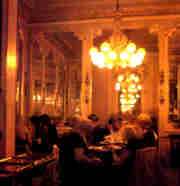
History The legendary Viennese café is known all over the world. This highly esteemed and very popular institution is visited by people from various countries. Furthermore many poets have written about it and a great number of songs deal with the famous Viennese Café, it`s still vivid tradition and it`s inviting atmosphere.
The legendary Viennese café is known all over the world. This highly esteemed and very popular institution is visited by people from various countries. Furthermore many poets have written about it and a great number of songs deal with the famous Viennese Café, it`s still vivid tradition and it`s inviting atmosphere.The history starts with the following legend: Twice the Viennese were able to ward off the Turks who laid siege to the city in 1529 and 1683. On the 12th of August in 1683, the Turks attacked the city of Vienna vehemently. Once again the citizens of Vienna under the leadership of count Starhemberg succeed in pushing back the enemy. But nevertheless they realized how dangerous their situation was. They needed help very urgently. Amongst them they nominated Georg Franz Kolschitzky as their mesenger to ask Karl von Lothringen for help. Thanks to him and Jan Sobieski, king of Poland, the turks were defeated. Kolschitzky asked the city-fathers to let him have the bags with nasty-looking green beans, which were left behind by the would-be conquerors after their retreat; and to place a house at his disposal where he would be able to establish the first Viennese coffee-house and to work as a "Kaffeesieder". This house was called "Blue Bottle". He roasted the green, plain beans, grinded them and boiled them with water. The outcome was the "coffee". First he could not sell much, because the people did not like the black, bitter beverage. One day, by misfortune, sugar got into the black hogwash and it was exactly what was missing. By some more experiments milk was mixed into it - and as a result the "Wiener Melange" was born, what was THE BIRTH OF A NATION'S PASSION FOR COFFEE...
In the middle of the 18th Century the basics of the café-tradition already existed. One could read there news-papers, play cards as well as the game of billards or just meet friends and have a nice chat with friends. (Foto right: Cafe Demel)
AnecdotesNot only poets spent their free time at the café "Central" but also the mayor of Vienna Karl Lueger and a young Russian emigrant called Laib Bronstein, better known as Mr. Trotzky.A civil servant of the Austrian ministry of forein affairs reading a newspaper expressed his opinion on the article about the Russian revolution: "Who is going to revolutionize Russia, surely not Mr Bronstein sitting at the Café Central?" (Foto: Cafe Central) Alfred Polgar wrote the following about the café Central which he visited regularly: The "Central" is a place for people who have to kill time in order not to be killed by it. When Peter Altenberg had died, the "Central" lost its importance as meeting place for poets. They all moved to the newly established café "Herrenhof". "Only mummies keep their word" wrote Anton Kuh.
Five men come to a Viennese café and order something.
|

back to Culture & History


Created 1994 by © LabelArt WebDesign - Austria

 But the reality is more prosaic. First of all Kolschitzky was not the first "coffee-brewer" and second he was a soldier, who spied as dozens of others too, he was just put up as symbol for his guild. Nevertheless quite a number of other personalities were responsible for the development of the tradition of the cafés like the Armenien Johannes Diodato nicknamed Deodat. He was awarded for his spying with the monopoly for the first coffee-selling for the period of 20 years. His fortune did not last long, because when Belgrad was besieged by Prinz Eugen, he was accused to have spyed for both parties.
But the reality is more prosaic. First of all Kolschitzky was not the first "coffee-brewer" and second he was a soldier, who spied as dozens of others too, he was just put up as symbol for his guild. Nevertheless quite a number of other personalities were responsible for the development of the tradition of the cafés like the Armenien Johannes Diodato nicknamed Deodat. He was awarded for his spying with the monopoly for the first coffee-selling for the period of 20 years. His fortune did not last long, because when Belgrad was besieged by Prinz Eugen, he was accused to have spyed for both parties.
